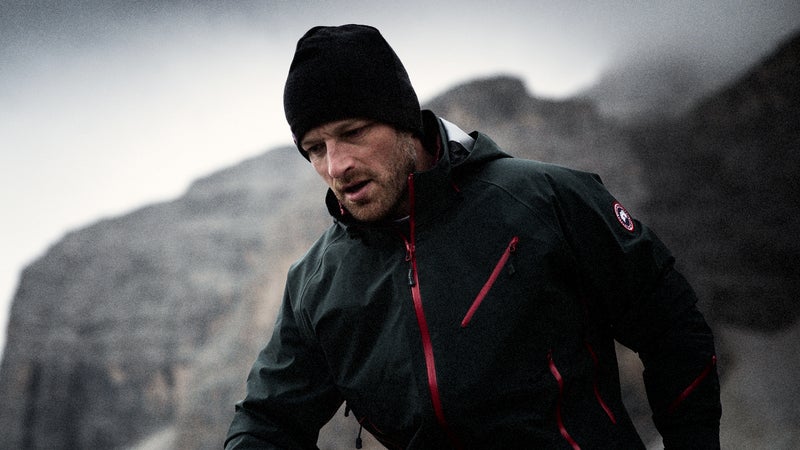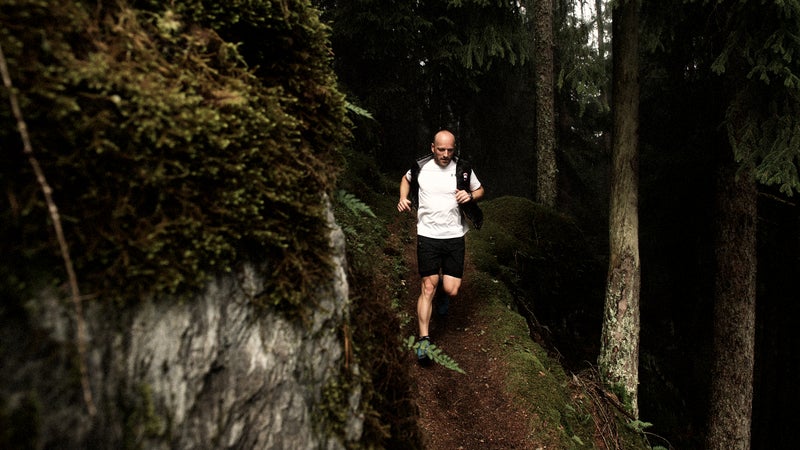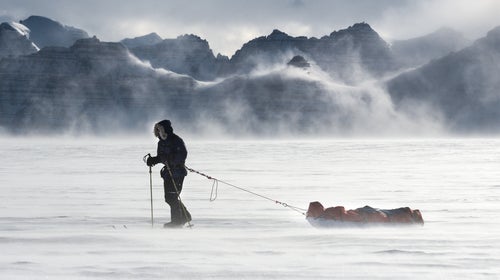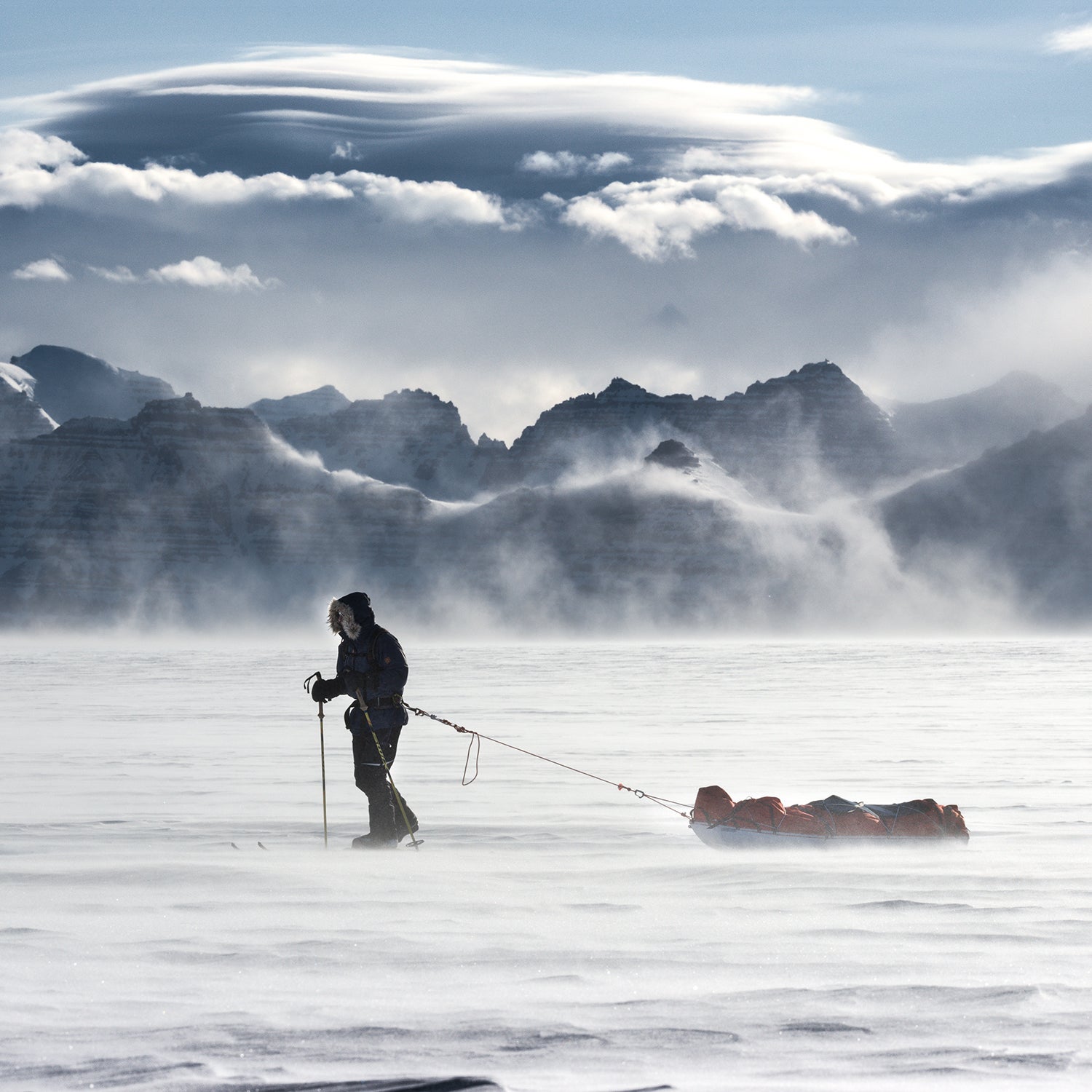“Dragging heavy things around cold places.” That’s how British polar adventurer describes his chosen career. Saunders, who set the record for the longest polar journey on foot in 2014 while retracing Robert Falcon Scott’s ill-fated 1912 attempt, is clearly in the right line of work.
This November, he embarks on his most ambitious endeavor yet: an expedition during which he plans to haul more than 300 pounds of gear across 1,000 miles of the frozen Antarctic continent, from west to east with zero assistance. If Saunders succeeds, he’ll become the first person to cross Antarctica solo, entirely unsupported and unassisted.
I caught up with Saunders on the phone from his flat in London, where he was making last-minute arrangements and trying his best to pack on some pounds before heading south. We talked about why he doesn’t consider himself an explorer, his passion for good zippers, and how the British are better at embracing misery than Americans.

OUTSIDE: The history of Antarctic expeditions and accomplishments can be a little confusing, with all the different methods and routes of reaching the poles and crossing the continent. Can you explain how your upcoming expedition differs from others that have been done?
SAUNDERS: It’s strange, particularly because there isn’t a governing body—there’s no international authority or rule book. Nowadays, as a tourist, you could fly to the South Pole, start from 50 feet away and say legitimately that you’ve walked to the South Pole, and you’d be correct. So, it’s becoming harder to differentiate and explain the difference, and I think there’s a misconception that it’s all already been done. That is emphatically not the case.
My plan is to make the first solo unsupported, unassisted crossing of Antarctica. I’ll be on my own for around 60, 65 days. And secondly, the plan is to make a crossing. It’s a point-to-point journey rather than round-trip. I think where it becomes confusing is all the definitions people use. It turns out that “unsupported” and “unassisted”—even though you’d think they mean the same thing—are often interpreted to mean different things. Essentially, it’s unsupported in that I’m having no external support. I’m not having air drops of food or fuel. I’m essentially self-sufficient, dragging my food and all the supplies that I’ll need for the entire journey.
A more recent term that’s been applied to these sort of trips is “unassisted.” Assistance in this case would mean using kites, or vehicles, or dogs, or some sort of mechanical means. My journey is a human-powered expedition. I’m traveling on my own motive, muscle powered. To me, it’s the difference between rowing and sailing.
Is there something about the purity and simplicity of this means of conveyance that appeals to you, as opposed to, say dogsleds?
One of the things I really treasure about these sessions is that they create the simplest existence imaginable. You wake up in the morning and don’t think about what to wear, because you’ve only got one set of clothes. You don’t need to think about what you’re going to eat, because you’ve got a vacuum-packed bag of rations for 24 hours. You’ve got to get up and walk in the right direction. Chances are you’ll see almost nothing at all of note in the ten hours that you’ll be outside.
In a way, it is a bit like being an astronaut. I’m completely reliant on this life-support system I’m dragging behind me, completely disconnected in a physical sense from civilization for a few months. When it comes to the preparation, there’s very little that is extraneous. Everything is kind of “mission critical,” and that, therefore, makes the preparation quite important. You’re reliant on the smallest things. If the zipper on my tent breaks, that’s a really big deal.
Did you apply any lessons from your 2014 expedition to this one, in terms of preparation or gear?
I took one of the outer sets of clothing that we wore in 2014 just to show the product design people at [Editor's Note: The outerwear company is supplying Saunders this year] the sorts of issues we had. In 2014, we tended to be pretty ham-fisted because we’re wearing enormous mittens. If you’re trying to close a zip in a blizzard at minus 40, you’re not gonna be delicate about it.
We ended up reinforcing the zips in our jackets using dental floss, sewing up each end of the zip so the runner couldn’t come off. I proudly showed this modification, saying, “You know, I think it might be worth reinforcing this.” They literally grabbed a jacket off the shelf and said, “We already did that.” So that’s one less thing to worry about.

Are you taking along any creature comforts?
I have music, which is a sort of guilty pleasure. It always sounds odd to mention Captain Scott in one sentence, and then say, “Oh yeah, I’m taking an iPod Shuffle to keep me going.” Music makes an enormous difference, I think, especially on your own.
I might try to take a few audiobooks. I didn’t really get on with them very well last time, because there are other things going on. You’ve got to be navigating, and paying attention to the GPS, and the time, and the terrain, and the weather. I’m surprisingly busy, and I found it really easy to lose my place in the audiobooks. And, of course, the iPod is buried under several layers of clothing, and hitting rewind is challenging wearing these oven gloves.
The literature and journalism of outdoor adventure always seem to be about overcoming really miserable situations. Why do you think that is? Why do we like misery?
People genuinely seem to respond fondly to the themes of struggle and self-doubt, overcoming adversity. Everyone has challenge in their lives, deals with self-doubt, and fear, and all of these very human things—procrastination and laziness. I think a part of the story I’m trying to tell is that I genuinely don’t believe I’m wired differently from anyone else. I still struggle with those things—the really challenging moments of fear and self-doubt. I’m sure there’ll be some huge hurdles to overcome on the ice. I think in some way, people can identify with that. Everyone’s experienced challenge. Everyone’s had a low day where they’ve struggled to make themselves take the next step toward their goal of whatever they’re pursuing. I think it resonates universally, the stories of challenge and striving.
It’s also very British. I think we’re quite cynical. We love a good disaster. America, I think, is slightly different. I’ve definitely had a different reception to my stories. I think in America, it’s still slightly more acceptable and valid to be ambitious and to talk openly about grand plans and goals. In the U.K., we really have this sort of thing—you should know your station in life and not try to venture beyond it.
How do you train for 1,000 miles of hauling a sledge?
The training is an interesting mix. I see myself, very much, as an athlete rather than an explorer. I’m not trying to find out where the South Pole is. That’s not the aim of this trip. I’m far more interested in the human limits of endurance. Training is unusual, because I have to be a jack-of-all-trades. On the one hand, it’s an ultra-endurance event. It’s a very, very long way to travel under your own steam. But by the same token, especially at the start, for the first few days it’s like a strongman event. You’re wearing this harness, trying to drag, at the start of this expedition, nearly 300 pounds—significantly heavier than me.
Then the third part—it sounds fun but I hate it—is putting on weight, literally fattening up before I go, which is going well. I turned 40 this summer, and I’m convinced it was a lot harder to put on weight in my twenties. Now it seems frighteningly easy.


